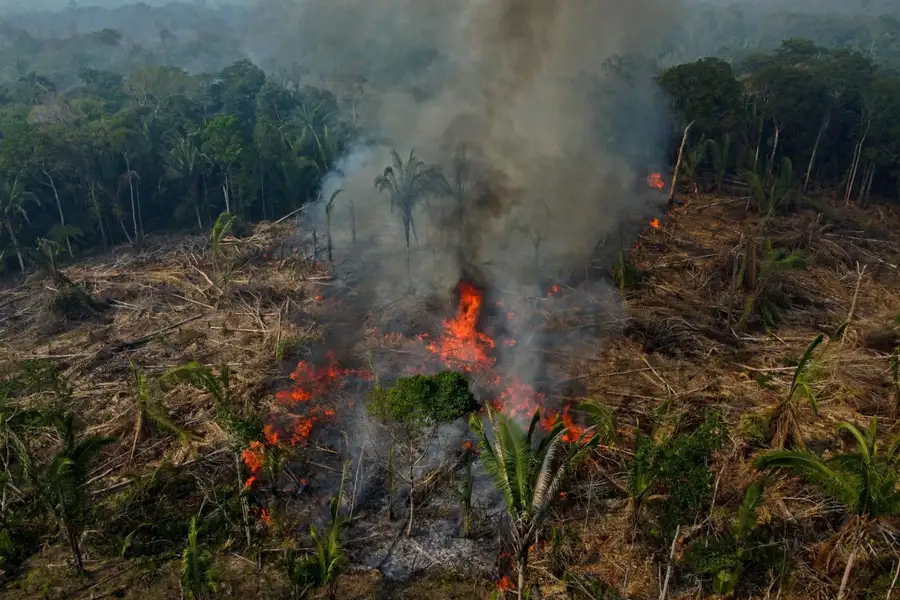
More Trees Cut Down in 2022 Despite Promises to Save Them
Environmental advocates are concerned that the world is heading in the wrong direction when it comes to forests
Even though world leaders promised to stop cutting down forests, about 6.6 million hectares of forests were lost in 2022. This is 4 percent more than in 2021, according to a report by a group of nature groups.

In addition to this evaluation, the WWF, one of the groups, issued a report explaining what should be done to stop cutting down forests. They want countries to stop giving harmful subsidies and to change how they trade products linked to deforestation.
Erin Matson at Climate Focus, who helped with the assessment, asks, “Why does the world keep doing the wrong thing with forests every year? The reason is clear if you see where we spend our money. We invest more in things that harm forests than in things that help them.”
In 2021, at the COP26 summit in Glasgow, over 100 countries, which are home to 85 percent of the world’s forests, promised to stop cutting down forests by 2030. But since deforestation is still going up, many countries aren’t doing what they promised, according to the assessment.
Mike Barrett at WWF-UK warns, “If we keep cutting down trees at the current speed, the Amazon could change into a dry grassland in just a few years. This would make it very hard to prevent dangerous climate changes.”
Out of the 6.6 million hectares of forests lost in the last year, 4.1 million hectares were primary forests, explains Matson. These are the ancient, irreplaceable forests, and they are incredibly valuable.

But it’s not just deforestation that’s a problem, Matson points out. In regions like North America and Europe, the forests that are still there are getting worse because of things like wildfires and partial logging.
“We hardly ever talk about the fact that forests in these regions, and in every world region, are not just being cleared, but where they are still standing, they’re losing carbon, losing their structural integrity, losing biodiversity year after year,” says Matson.
However, the assessment does have some good news. More than 50 countries are on the right path to stop cutting down their forests by 2030. For example, Indonesia and Malaysia are seeing less and less deforestation.
The WWF report asks for more action. Governments should stop supporting activities that cause deforestation and start supporting activities that help forests.
Matson mentions that there’s unused farmland in Brazil that could be made productive with some investment, which would reduce the need to cut down more forest.
Trade changes are also necessary. The report suggests that products like beef, timber, palm oil, and soy should only be allowed for export if they come from sources that are sustainable.
The European Union has put in place some rules this year to cut down on the import of products that harm the environment. However, Darragh Conway at Climate Focus believes that more actions are necessary to make sure that products banned in the EU are not just sent to other places.
Mike Barrett disagrees with putting the burden on consumers to figure out if the things they buy are forest-friendly. He thinks governments should make sure that products causing deforestation can’t be sold.
“We should be able to buy any products in the UK knowing that they are deforestation free. That’s not too much to ask. That needs to happen now.”
Additionally, there’s a need to respect the rights of Indigenous people when it comes to their land. According to Mary Gagen at WWF-UK, who co-authored the report, Indigenous peoples are the best guardians of forests.
This report is the first of its kind on a global scale, outlining how we can save our forests. Gagen says, “It lays out, for the first time, the steps to stop destroying forests, fulfill international commitments, and bring our forests back to life.”
Never miss any important news. Subscribe to our newsletter.
Related News


British Investor Who Predicted US Slump Warns of Next Crash

I’m a Death Doula: 4 Reasons I Believe Death Isn’t the End


Tech to Reverse Climate Change & Revive Extinct Species

AI Unlocks the Brain’s Intelligence Pathways

XPENG Unveils Iron Robot with 60 Human-like Joints

Can AI Outsmart Humanity?

11 ChatGPT Prompts to Boost Your Personal Brand

Keir Starmer Hints at Possible Tax Hikes on Asset Income

Navigating the Future of AI: Insights from Eric Schmidt
